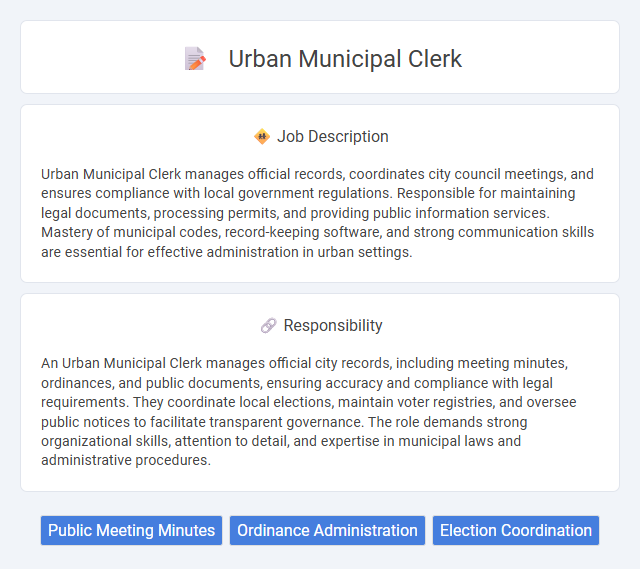
Urban Municipal Clerk manages official records, coordinates city council meetings, and ensures compliance with local government regulations. Responsible for maintaining legal documents, processing permits, and providing public information services. Mastery of municipal codes, record-keeping software, and strong communication skills are essential for effective administration in urban settings.
Urban Municipal Clerk roles likely suit individuals who are detail-oriented and comfortable managing administrative tasks within local government settings. Those who thrive in structured environments and possess strong communication skills may find this position aligns well with their abilities. People less inclined toward repetitive clerical work or public interaction might find the demands of this job challenging.
Qualification
Urban Municipal Clerk positions require a combination of formal education and practical experience, typically including a high school diploma or associate degree, with many employers preferring candidates with a bachelor's degree in public administration or a related field. Key qualifications involve proficiency in record keeping, understanding municipal codes and regulations, and expertise in using document management software. Strong communication skills and the ability to manage public records accurately are essential for effective civic administration.
Responsibility
An Urban Municipal Clerk manages official city records, including meeting minutes, ordinances, and public documents, ensuring accuracy and compliance with legal requirements. They coordinate local elections, maintain voter registries, and oversee public notices to facilitate transparent governance. The role demands strong organizational skills, attention to detail, and expertise in municipal laws and administrative procedures.
Benefit
Urban Municipal Clerk positions likely offer benefits such as stable employment with potential for career growth, comprehensive health insurance, and pension plans. The role may also provide opportunities for professional development and training, enhancing administrative skills. Working in a local government setting could grant access to work-life balance initiatives and community engagement programs.
Challenge
The role of an Urban Municipal Clerk likely involves navigating complex regulatory frameworks and managing detailed public records, which can present significant organizational challenges. Handling diverse community requests while ensuring compliance with local government policies may require strong multitasking and problem-solving skills. There is a high probability that balancing administrative duties with public accountability demands adaptability and resilience in this position.
Career Advancement
Urban Municipal Clerks play a vital role in managing city records, legal documents, and public information, providing a strong foundation for career advancement within local government sectors. Experience as a Municipal Clerk often leads to higher administrative positions such as City Manager, City Clerk Supervisor, or roles in public administration and governance. Skills in public records management, knowledge of municipal law, and proficiency with government software enhance promotion opportunities in urban administrative careers.
Key Terms
Public Meeting Minutes
Urban Municipal Clerks are responsible for accurately recording public meeting minutes, ensuring legal compliance and transparency for city governance. These minutes serve as official records documenting discussions, decisions, and resolutions in municipal meetings. Expertise in detailed note-taking, transcription, and archiving is critical to maintain precise and accessible public records.
Ordinance Administration
Urban Municipal Clerks play a crucial role in ordinance administration by ensuring accurate drafting, recording, and dissemination of municipal codes and regulations. They maintain official records of city council meetings, manage public access to ordinance documentation, and coordinate the legal review process to guarantee compliance with local and state laws. Efficient ordinance administration by municipal clerks supports transparent governance and facilitates community engagement in urban policy development.
Election Coordination
Urban Municipal Clerks specialize in election coordination, managing voter registration databases, verifying candidate eligibility, and organizing polling locations to ensure smooth electoral processes. They oversee ballot preparation, coordinate with local election boards, and implement compliance measures in accordance with state and federal election laws. Expertise in data management systems and strong communication skills are essential for effectively administering urban municipal elections.
 kuljobs.com
kuljobs.com